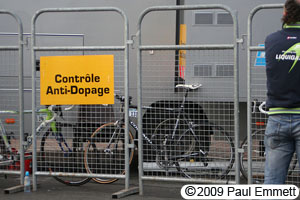 “Athletes who cheat and those who assist them are much more likely to get caught,” IOC president Jacques Rogge claimed at today’s WADA meeting in Stockholm. The Belgian was speaking on the same day that WADA launched its biological passport initiative, echoing an earlier programme started by the UCI. This will be implemented by the various anti-doping organisations worldwide, with WADA providing harmonized guidelines.
“Athletes who cheat and those who assist them are much more likely to get caught,” IOC president Jacques Rogge claimed at today’s WADA meeting in Stockholm. The Belgian was speaking on the same day that WADA launched its biological passport initiative, echoing an earlier programme started by the UCI. This will be implemented by the various anti-doping organisations worldwide, with WADA providing harmonized guidelines.
Rogge referred to what he said was the “corrosive evil” of doping, and pointed out that the IOC now stores samples for up to eight years after an event. This enables it to be able to retroactively test them when new detection methods are introduced.
Retroactive testing is what snagged Olympic gold medallist Rashid Ramzi, cyclists Davide Rebellin and Stefan Schumacher, plus two others after the Beijing 2008 Games. The competitors were announced as positive earlier this year, and were finally stripped of their medals last month.
“Cheaters can no longer assume that their secret is safe,” Rogge stated, according to AFP. “Wada has helped change attitudes toward doping and doping is now widely recognised for what it is: a corrosive evil that threatens the integrity of sports.”
He said that those who wish to cheat will continue to try to find new ways to do so, and that the anti-doping authorities will continue to “seek new ways to stop them.” He said that genetic doping would be, “the next battleground”.
WADA Director General David Howman today spoke about the recently-approved harmonized protocols and operating guidelines for the Athlete Biological Passport. As is the case with the UCI version, the collection and analysis of data seeks to trace the biological parameters for each athlete, more readily determining if there has been any suspicious behaviour.
“The Athlete Biological Passport adds a powerful new tool to support the fight against doping,” said Howman. “Coupled with existing and future strategies, we are confident that this model will make any prohibited preparation far harder to implement by those athletes who may still take the risk to cheat.
“We know that the effects of drugs remain detectable longer in the body than the substances themselves. The Athlete Biological Passport will allow the anti-doping community to exploit this reality through an increasingly biological and global approach, similar to that used in forensic science.”
Rogge backs this, and says that the coaches and doctors who either encourage or facilitate doped athletes must also be liable to sanction or penalty. “We should be just as tough on them as we are on athletes who cheat,” he stated.
Today’s news means that further pressure is being applied in the fight against the problem, making it increasingly difficult for competitors to defraud others.